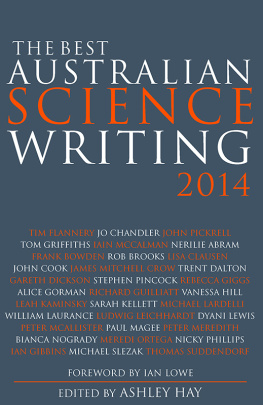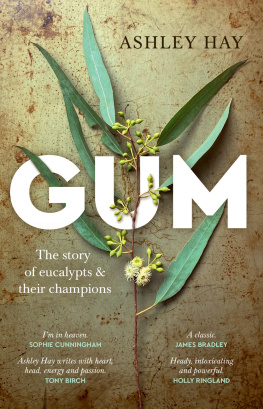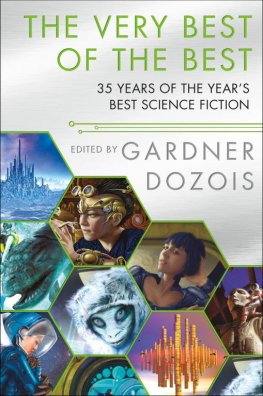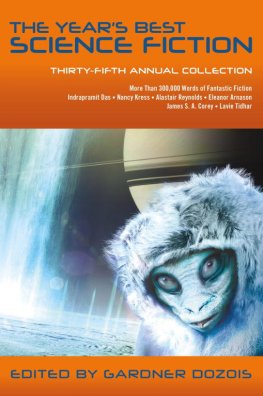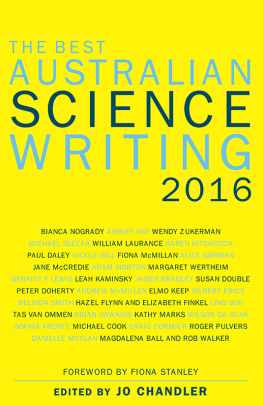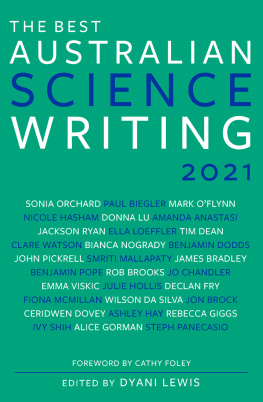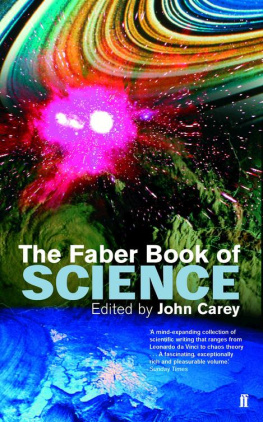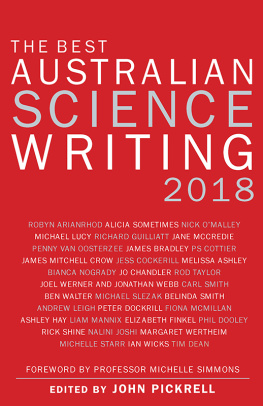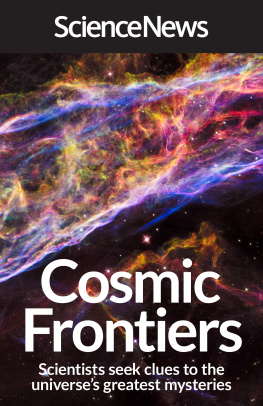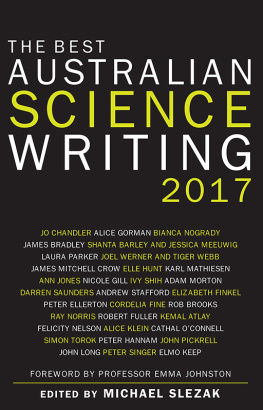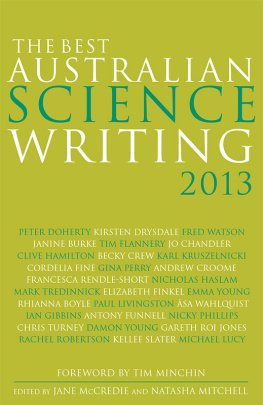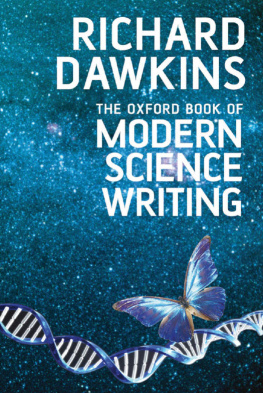THE BEST AUSTRALIAN SCIENCE WRITING 2014
ASHLEY HAY is the author of four books of narrative non-fiction (including Gum: The story of eucalypts and their champions) and two novels. Her 2013 novel The Railwaymans Wife was shortlisted in the fiction category of the NSW Premiers Literary Awards, in which it won the Peoples Choice Award. She was literary editor of The Bulletin and her science writing covering subjects from mosquitoes and robotics to historical collectors and hobbits has appeared in many publications, including The Monthly, Australian Geographic and Griffith REVIEW. Her work was awarded one of the inaugural Bragg Prizes for Science Writing in 2012 and shortlisted for a Eureka award.
THE BEST AUSTRALIAN SCIENCE WRITING 2014
EDITED BY
ASHLEY HAY

For Nigel Beebe, and for Huxley Hay Beebe A.H.
A NewSouth book
Published by
NewSouth Publishing
University of New South Wales Press Ltd
University of New South Wales
Sydney NSW 2052
AUSTRALIA
newsouthpublishing.com
University of New South Wales Press Ltd 2014
First published 2014
This book is copyright. While copyright of the work as a whole is vested in University of New South Wales Press Ltd, copyright of individual chapters is retained by the chapter authors. Apart from any fair dealing for the purpose of private study, research, criticism or review, as permitted under the Copyright Act, no part of this book may be reproduced by any process without written permission. Inquiries should be addressed to the publisher.
National Library of Australia Cataloguing-in-Publication entry
Title: The Best Australian Science Writing 2014/Ashley Hay, editor.
ISBN: 9781742234182 (paperback)
9781742247137 (ePDF)
9781742241883 (ePub/Kindle)
Subjects: Technical writing Australia.
Communication in science Australia.
Science in literature.
Other Authors/Contributors: Hay, Ashley, 1971, editor.
Dewey Number: 808.0665
Design Josephine Pajor-Markus
All reasonable efforts were taken to obtain permission to use copyright material reproduced in this book, but in some cases copyright could not be traced. The publisher welcomes information in this regard.
This book is printed on paper using fibre supplied from plantation or sustainably managed forests.

Contents
Ian Lowe
Ashley Hay
Ludwig Leichhardt
Nicky Phillips
William Laurance
James Mitchell Crow
John Cook
Tom Griffiths
Peter Meredith
Ian Gibbins
Nerilie Abram
Tim Flannery
Michael Lardelli
Iain McCalman
Gareth Dickson
Dyani Lewis
Sarah Kellett
John Pickrell
Rebecca Giggs
Michael Slezak
Paul Magee
Lisa Clausen
Trent Dalton
Thomas Suddendorf
Peter McAllister
Rob Brooks
Frank Bowden
Jo Chandler
Leah Kaminsky
Richard Guilliatt
Meredi Ortega
Alice Gorman
Bianca Nogrady
Stephen Pincock
Vanessa Hill
Contributors
NERILIE ABRAM is an Australian Research Council QEII Fellow at the ANU. Her research looks at how Earths climate has behaved in the past, and what that tells us about recent climate changes. She does this by developing past climate records from natural archives such as tropical reef corals and Antarctic ice cores.
FRANK BOWDEN is an infectious diseases physician, professor of medicine at the Australian National University and a senior administrator with ACT Health. He teaches evidence-based medicine and infectious diseases to medical students and has a special interest in population health, junior doctor training and the music of Brian Eno. His book Gone Viral: The germs that share our lives was shortlisted for a Queensland Literary Prize in 2012.
ROB BROOKS is director of the Evolution and Ecology Research Centre at UNSW Australia. He is an internationally recognised expert on evolutionary biology and sexual conflict, and winner of the Australian Academy of Sciences Fenner Medal. He won the 2012 Queensland Literary Award for Science Writing for his book Sex, Genes & Rock n Roll: How evolution has shaped the modern world, and the 2013 Australian Government Eureka Prize for Science Communication.
JO CHANDLER is an award-winning journalist and writer. After a long career in daily newspapers, she is now freelance, focusing on science and medicine, climate change, human rights, womens issues and development. An extract from her book Feeling the Heat dispatches from the climate frontline earned her the inaugural Bragg UNSW Press Prize for science writing in 2012. She has also won a Walkley, a Quill, and a Eureka Prize. This is her third appearance in BASW.
LISA CLAUSEN is a Melbourne-based writer. She was a journalist on newspapers in Adelaide, Sydney and Melbourne before joining the South Pacific edition of Time, where she covered stories in Papua New Guinea, East Timor, Vanuatu and across Australia for more than a decade as a senior writer. She now writes about Australian history, science and the environment for leading publications such as the Monthly and Fairfaxs Good Weekend magazine.
JOHN COOK is the Climate Communication Fellow for the Global Change Institute at the University of Queensland. He created the website , which won the 2011 Australian Museum Eureka Prize for the Advancement of Climate Change Knowledge. John is the co-author of Climate Change Science: A modern synthesis and Climate Change Denial: Heads in the sand and has written a number of peer-reviewed papers on climate change and the psychology of misinformation.
TRENT DALTON writes for The Weekend Australian Magazine. A Walkley Award winner, he has been the national News Awards Feature Journalist of the Year three times and was Queensland Journalist of the Year in 2011. His journalism has twice been nominated for a United Nations Association of Australia Media Peace Award. His writing also includes several award-winning screenplays, including Glenn Owen Dodds, which won the prestigious International Prix Canal award at The Clermont-Ferrand International Short Film Festival in France and saw Dalton named Best Writer at Aspen Shortsfest 2010.
GARETH DICKSON was born in Melbourne and graduated with a Masters in Creative Writing from the University of Queensland in 2009. He is currently undertaking a PhD, also in Creative Writing, at the University of Queensland. He has published stories and poems in numerous journals and magazines, both in Australia and abroad, including the White Review, which shortlisted Popular Mechanics for their annual short story prize in 2013. He currently divides his time between Brisbane and London.
TIM FLANNERY has written 32 books including the award-winning The Future Eaters and The Weather Makers, now available in over 20 languages. The author of more than 130 peer-reviewed papers, he has also made numerous documentaries and regularly reviews for the New York Review of Books. In 2007 he was named Australian of the Year. A founding member of the Wentworth Group of Concerned Scientists, he became Australias Chief Climate Commissioner in 2011, and in 2013 he founded the Australian Climate Council, which he now heads.
Next page
